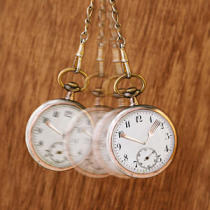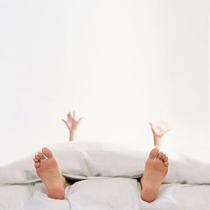4 Easy Ways to Become a Morning Person

By: Bethany Gumper
I've always wanted to be one of those women who jump out of bed and into a pair of running shoes at 7 a.m. What an amazing feeling: to stroll into work after a three-mile jog, a Spinning class, or a series of sun salutations. But I wouldn't know.
To fix this issue, I met with sleep guru Colette Haward, MD, a psychiatrist in New York City. "There's a genetic component to your circadian clock. But for many people, behavioral changes make a big difference," Dr. Haward says. Read below to see how I finally became a morning person and you can, too.
Related: 8 Ways to Save Time at Home
Size Up Your Zzz's
The first question Dr. Haward asks me is how much I sleep. "A lot! I turn in by midnight and get up around eight. Why is it so difficult to get out of bed every morning?" I complain. She tells me to track when I get into bed, fall asleep, and get up and if I wake during the night for two weeks. "This is the best way to objectively assess whether you have a sleep disorder or just need to change your habits," she explains.
The log is, well, eye-opening. Most nights my head hits the pillow closer to 2 a.m. Seriously? No wonder I'm a zombie in the mornings; the eight hours I thought I was snoozing just turned into six. "Many people think they're getting more or less than they actually are," Dr. Haward says. "Your sleep cycle is pushed back a few hours. It's delayed at night, which causes excessive sleepiness in the morning and during the day."
Related: 6 Secrets to a Calmer, Saner Life

Reset Your Internal Clock
I learn from my snooze sage that to get back on track, I need to stick to a reasonable sleep schedule. But a little research shows me there isn't a one-size-fits-all answer to how much I need each night. When Harvard Medical School scientists monitored hormone levels in people who slept more than nine hours nightly and compared them with those of others who slept less than six, the sleepyheads secreted more melatonin. Translation: Some bodies are hardwired for more sleep, others less. (Hmm.... Something tells me that won't fly as an excuse in the office. "I'm so sorry I missed our 8:00 a.m. meeting, boss, but my circadian clock didn't go off.")
"The best way to determine your individual sleep needs is to let your body guide you during a week of vacation. In other words, don't use an alarm clock," Dr. Haward says. Since I don't have any getaways coming up, she suggests that I start with seven to eight hours a night (the average amount adults need, although some naturally need more) and see how I feel."Be militant about these times, even on the weekends, when you're used to sleeping in. A regular schedule is crucial,"
Related: How to Add More Hours to the Day

Create a Sleep Sanctuary
Once I know when to sleep, we discuss where I sleep. A snooze-friendly bedroom is, you guessed it, dark (light suppresses the secretion of sleep-inducing melatonin) and quiet. It also needs to be cool to allow you to sleep comfortably. "The magic number for a sleep-friendly room is around 69 degrees Fahrenheit," Dr. Haward tells me. Before you sleep, your body temperature drops. As your brain releases melatonin, your body is chilling out -- literally. When the morning approaches, melatonin decreases and you start to wake up.
Dr. Haward recommends taking 30 minutes to prepare myself for sleep with a three-step plan: (1) Take a hot bath or shower (when you step out, your body temperature drops, which encourages sleep); (2) jot down a list of anything you're worried about to clear your mind; and (3) dim the lights and meditate, do some deep breathing or practice progressive relaxation, in which you slowly tense and then relax all your muscles from scalp to toes. And no more Late Show with David Letterman. Dr. Haward notes that televisions, cell phones, and computer screens all emit blue light, which has been shown to suppress melatonin production.
Related: 20-Minute Workout for Stress Relief

Bypass the Snooze Button
On any given day, I hit the darn snoozer anywhere from three to six times. What's the big deal? Turns out, besides robbing myself of 30 to 60 minutes of sleep, I'm messing with my system. "It generally takes about an hour to reach deep, restorative sleep. Your fragmented morning dozing actually leaves you more tired," Dr. Haward explains.
Status Check
Ever since I discovered my inner morning person, I wake up at five every day. Just kidding. But it's way easier to get out of bed most of the time. The night after my two-week experiment ended, I decided to tempt fate and not set the 7:30 alarm. I awoke at a perfectly respectable 8:00! Now I'm typically up and moving at 7:30 on weekdays and 8:30 on weekends. My energy has increased, I no longer doze off on the subway in the morning, I'm in a better mood, and I've even dropped a few pounds, thanks to my new morning running routine.
More from FITNESS Magazine:
